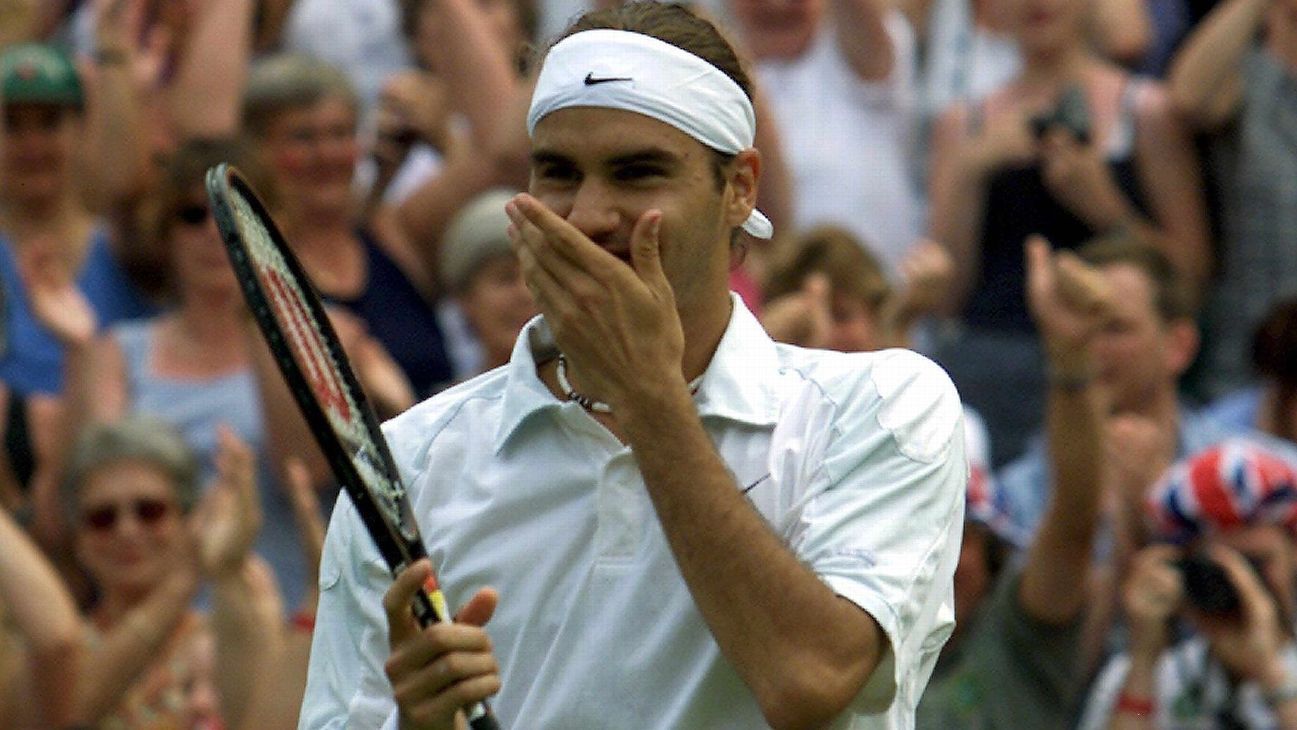Roger Federer’s Victorious Path at Wimbledon Begins
On June 25, 2001, Roger Federer embarked on a journey that would solidify his status as one of the greatest tennis players of all time. After two unsuccessful main draw appearances, the Swiss maestro celebrated his first win at the All England Club, setting the stage for his remarkable career at Wimbledon.
Arriving at the Cathedral of Tennis as the 15th-ranked player in the world, Federer had previously suffered early exits in the tournament. In 1999, ranked 103rd, he fell to Jiri Novak from the Czech Republic in the first round. The following year, already among the top 35 players, he was defeated by Yevgeny Kafelnikov of Russia. However, the 2001 edition marked a turning point in Federer’s career.
In the first round, Federer secured a solid victory over Belgium’s Christophe Rochus, winning 6-2, 6-3, and 6-2 in just over an hour. This triumph marked the first of 105 victories he would achieve throughout his illustrious career. With this win, Federer advanced to the quarterfinals for the second time in his career, following his previous success at Roland Garros weeks earlier. However, it was his marathon battle with Pete Sampras that captured the world’s attention.
Sampras, a seven-time champion at Wimbledon, faced fierce resistance from the young Swiss player. The match went down in history as one of the most memorable encounters at the tournament, with Federer eventually prevailing 7-6 (7), 5-7, 6-4, 6-7 (2), and 7-5 after three hours and 41 minutes on the hallowed turf. Although Federer was eliminated in the next round by Tim Henman, a local favorite, his journey at Wimbledon had only just begun.
Over the years, Federer went on to win an incredible eight Wimbledon titles, amassing a record of 105 wins and 14 losses. This remarkable achievement firmly established him among the greatest figures in tennis. In the current edition of the tournament, Novak Djokovic has the opportunity to equal Federer’s record as the player with the most titles at Wimbledon.
As we reflect on Federer’s journey, his legacy as a Wimbledon legend is undeniable. His skill, grace, and sportsmanship have inspired generations of tennis players and fans alike. The Swiss maestro’s impact on the sport will be felt for years to come.
For fans eager to catch all the tennis action, ESPN’s coverage can be enjoyed via streaming on Star+. Subscribe now to witness the excitement unfold on the hallowed lawns of Wimbledon.
How did Roger Federer perform in the third round of the tournament before being defeated by Tim Henman?
He made it to the third round before being defeated by Tim Henman.
However, in 2001, Federer was determined to make a statement and showcase his talent on one of the most prestigious tennis stages in the world. His first-round match against Christophe Rochus of Belgium proved to be a challenging one, as the Swiss maestro dropped the first set. But Federer quickly found his rhythm and won the next three sets in dominant fashion, securing his first-ever victory at Wimbledon.
From that moment on, Federer never looked back. He went on to defeat the likes of Xavier Malisse, Petr Korda, and Sampras-conqueror Roger Haas in the following rounds, showcasing his versatility and unmatched skill on grass courts. In the quarterfinals, he faced Australian champion Pat Rafter, who was known for his serve-and-volley game. However, Federer’s powerful groundstrokes and precise movement on the court proved to be too much for Rafter, as he secured a straight-sets victory.
The semifinal clash against British hopeful Tim Henman created an electrifying atmosphere at the All England Club. Henman, a fan-favorite, was aiming to become the first British player to reach the Wimbledon final in over 30 years. However, Federer’s shot-making ability and his steadfast resolve in tight situations propelled him to victory in four sets.
Finally, on July 8, 2001, Federer found himself in the Wimbledon final for the first time, facing off against Australian player Mark Philippoussis. Despite Philippoussis’ powerful serve and attacking style, it was Federer who reigned supreme. The Swiss maestro showcased his immense talent, precision, and flair, capturing his debut Wimbledon title in straight sets.
This triumph marked the beginning of an extraordinary journey for Roger Federer at Wimbledon. Over the years, he would go on to win the tournament a record-breaking eight times, becoming the most successful player in Wimbledon history. His graceful style, exceptional technique, and unwavering determination have made him a living legend at the All England Club.
As we celebrate the 20th anniversary of Federer’s first Wimbledon victory, it serves as a reminder of the incredible talent and indomitable spirit that has propelled him to greatness. With his magnetic charisma and unrivaled skills, Federer has captivated fans around the world and continues to inspire future generations of tennis players. His victorious path at Wimbledon is a testament to his enduring legacy in the sport and his status as one of the greatest athletes of all time.


“Astonishing and inspiring! Roger Federer’s historic journey at Wimbledon has been nothing short of extraordinary, from his first win to his unmatched record as the greatest champion. A true legend of the sport whose grace and skill continue to mesmerize. Forever grateful to witness his greatness on the grass courts of Wimbledon.”
What a remarkable journey it has been for Roger Federer at Wimbledon! He started with a first win, and now stands proudly as the greatest champion. His legacy and dominance on those prestigious grass courts will forever inspire generations to come.